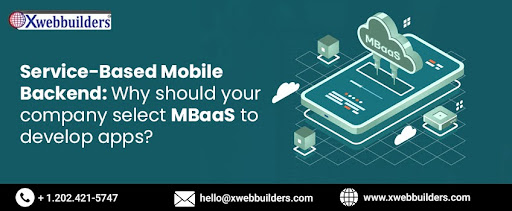
September 01, 2025

As mobile app development continues to grow, companies are increasingly seeking efficient ways to streamline the backend processes. This is where Mobile Backend as a Service (MBaaS) comes into play. MBaaS offers a service-based approach to handle backend tasks, providing pre-built functionalities and cloud infrastructure. This allows companies to focus on the frontend development and user experience without worrying about backend complexities.
In this introduction, our mobile app development company in Ashburn will explore the advantages of selecting MBaaS for app development, including faster time-to-market, scalability, reduced development costs, simplified backend management, and integration with third-party services.
A service-based mobile backend refers to the infrastructure and functionality required to support the backend operations of mobile applications. It involves the use of services provided by Mobile Backend as a Service (MBaaS) platforms that handle key backend tasks such as data storage, user authentication, push notifications, and integration with third-party services. By leveraging a service-based mobile backend, companies can streamline the development process, reduce costs, and accelerate time-to-market for their mobile applications. These platforms provide a scalable and flexible infrastructure, allowing businesses to focus on delivering exceptional user experiences without the complexities of building and maintaining their backend infrastructure.
Service-based mobile backend solutions offer numerous benefits for companies developing mobile applications. Here are the key advantages of using a service-based mobile backend:
Faster Development: Service-based mobile backend platforms provide pre-built functionalities and services that significantly speed up the development process. Instead of building backend infrastructure from scratch, developers can leverage ready-made modules for common tasks like user authentication, data storage, and push notifications. This accelerates development timelines, allowing companies to bring their apps to market faster.
Cost Efficiency: Developing and maintaining a robust backend infrastructure can be expensive and time-consuming. Service-based mobile backend platforms offer cost efficiency by eliminating the need for companies to invest in hardware, server maintenance, and infrastructure setup. Instead, they can utilize the infrastructure provided by the platform, paying for only the services they use. This lowers upfront costs and ongoing operational expenses.
Scalability: Service-based mobile backend platforms are designed to handle scalability seamlessly. They offer elastic resources and can scale up or down based on demand. This flexibility ensures that the app's backend can accommodate sudden spikes in user activity or accommodate growing user bases without performance degradation. With a service-based mobile backend, companies can scale their applications without worrying about infrastructure constraints.
Simplified Backend Management: Service-based mobile backend platforms abstract away the complexities of managing backend infrastructure. They handle tasks like server maintenance, security, and performance optimization, allowing developers to focus on core app development rather than backend operations. This simplifies backend management and frees up resources to be allocated towards enhancing the app's user experience.
Integration with Third-Party Services: Service-based mobile backend platforms provide seamless integration with various third-party services and APIs. This allows developers to extend the functionality of their apps by integrating with popular services like social media platforms, payment gateways, mapping services, and more. Integration with third-party services enhances the app's capabilities and provides a richer experience for users.
Real-Time Data Synchronization: Many service-based mobile backend platforms offer real-time data synchronization capabilities. This means that changes made by users on different devices are instantly propagated across all devices, ensuring data consistency and improving collaboration features. Real-time data synchronization enhances the user experience and enables real-time interactions in applications such as messaging apps, collaborative tools, and real-time dashboards.
Analytics and Insights: Service-based mobile backend platforms often include analytics and reporting features that provide valuable insights into app usage, user behavior, and performance metrics. These analytics help companies understand their users better, make data-driven decisions, and optimize their app's performance and user experience.
By utilizing a service-based mobile backend, companies can reap these benefits and focus their efforts on building compelling user experiences, leveraging the platform's infrastructure and functionalities. It allows them to accelerate development, reduce costs, ensure scalability, simplify backend management, integrate with third-party services, enable real-time data synchronization, and gain valuable analytics insights.
Service-based mobile backend platforms find applications across various industries and types of mobile applications. Here are some key areas where service-based mobile backend solutions are commonly utilized:
Social Networking and Messaging Apps: Service-based mobile backend platforms are widely used in the development of social networking apps, messaging apps, and other communication platforms. These platforms provide features like user authentication, real-time messaging, push notifications, and media storage, enabling developers to build highly interactive and engaging social applications.
E-commerce and Retail Apps: Service-based mobile backend platforms offer essential functionalities for e-commerce and retail applications. They provide secure payment gateways, inventory management, order processing, and customer management capabilities. These features ensure smooth and secure transactions, inventory tracking, and personalized user experiences.
On-demand Services: Service-based mobile backend platforms are well-suited for on-demand service applications such as food delivery, transportation, home services, and more. These platforms provide features like real-time tracking, location-based services, user reviews, and ratings. They enable efficient matching of service providers with customers, streamlined order management, and seamless communication between users and service providers.
Health and Fitness Apps: Mobile apps in the healthcare and fitness industry leverage service-based mobile backend platforms to provide functionalities like user profile management, health data storage, activity tracking, and personalized recommendations. These platforms enable secure storage of sensitive health information and allow users to track their progress and receive personalized insights.
Travel and Hospitality Apps: Service-based mobile backend platforms play a crucial role in travel and hospitality applications. They offer features like location-based services, real-time flight and hotel bookings, itinerary management, and reviews and ratings. These platforms provide seamless integration with travel and hospitality services, making it easier for users to plan their trips and access relevant information.
Education and E-learning Apps: Service-based mobile backend platforms are utilized in the development of educational and e-learning applications. They offer functionalities like user authentication, content management, progress tracking, and communication features. These platforms facilitate the delivery of educational content, interactive quizzes, and communication between students and instructors.
Gaming Apps: Service-based mobile backend platforms provide critical features for gaming applications, such as user authentication, leaderboards, multiplayer capabilities, and in-app purchases. These platforms enable real-time multiplayer interactions, social gaming features, and the integration of virtual currency and rewards.
These are just a few examples of how service-based mobile backend platforms are applied across various industries. The flexibility and scalability of these platforms make them suitable for a wide range of mobile applications. Companies can leverage the pre-built functionalities and infrastructure provided by these platforms to accelerate development, enhance user experiences, and focus on their core business objectives.
In conclusion, choosing Mobile Backend as a Service (MBaaS) for app development can greatly benefit your company. By leveraging pre-built functionalities and cloud infrastructure, MBaaS enables faster time-to-market, scalability, and reduced development costs. It simplifies backend management and allows your team to focus on creating exceptional user experiences. Additionally, MBaaS offers seamless integration with third-party services, expanding the capabilities of your app. Whether you're a small startup or a large enterprise, selecting MBaaS can provide the necessary tools and infrastructure to develop high-quality apps efficiently. Embracing MBaaS empowers your company to stay competitive in the dynamic world of mobile app development. For more information, visit Xwebbuilders.com.